This is the transcript for my podcast. If you want to have my voice in your ear holes instead of having to run your eyes along jagged, sometimes pointy letters, then you can click here to play it in the browser. To subscribe on iTunes, click here. Go here to subscribe on iTunes.
Have feedback? Correction? Just want to say hi and request a story for the podcast? Connect with me on twitter! Or leave a comment below.
The Show!
This week on the Myths and Legends podcast, it should come as no surprise that old grudges resurface to come crashing down on the newly-restored Volsung kingdom, leaving the family once again down to a sole heir, exiled to a far-away land. Also, there’s the introduction of a cursed ring, in the nasty little pocketsess of tricksy Loki. The creature of the week is the leprechaun’s drunk, mean cousin, who is definitely judging your poor taste in wine.
This is the Myths and Legends podcast, episode 3C: Renewed shall be blade that was broken.
Previously
This is a podcast where I tell the original tales behind legendary stories. Some are popular stories you think you know, but with surprising origins. Others are stories you probably haven’t heard, but really should.
Previously on the podcast, we started the story of the Volsungs. The patriarch, King Volsung, had a son named Sigmund who pulled a sword from a tree when no one else could, a challenge from Odin himself, insulting his brother-in-law and leading to a spiral of revenge that left Sigmund and his son, Sinfjotli, as the only surviving Volsungs. They return to their land, and Sigmund married Borghild. While out raiding, Sinfjotli and Borghild’s brother get into an argument over a woman, and decide to settle it with a duel, which Sinfjotli handily wins. Borghild is beside herself with grief and rage, and at her brother’s wake, she poisons Sinfjolti, who immediately collapses at the table.
Crying in your beer
In his inebriated state, Sigmund can barely process what’s happening. He rushes over and tries to rouse his son. Perhaps he has just passed out from too much drinking, but no, he tries to rouse the man, and sees that his eyes are open and he’s unresponsive. He is dead.
Rage flashes over him, and he turns to his wife, who is standing there, holding the jug of poisoned ale, unrepentant. The true weight of what just happened crashes over him, and he is hit with grief and sorrow. He takes his son’s body in his arms, and carries him out of the hall and into the forest.
I don’t know if legendary norse heroes wept or not, but I can imagine he was thinking about all the experiences he had with the man. From the first test with the snake in the bag, to the bizarre time where they were werewolves together, to the years they spent in the wilderness, preparing to avenge King Volsung. Then, finally spending relatively peaceful years ruling a kingdom as father and son. Now Sinfjotli, the only other true Volsung and the only link Sigmund had to his past was dead, by his wife’s hand. Like I said, I don’t know if Norse warriors wept, but if they do, Sigmund was weeping. He came to a fjord.
He saw a man paddle up in a small boat, only big enough for two. The man, though dressed like a humble fisherman, carried himself with the poise and gravitas of a god. He rowed up to the bank with Sigmund and Sinfjotli, and asked if they would like passage across the fjord. Sigmund said yes, but was informed that the boat was only big enough for two. The man would have to row Sinfjotli’s corpse over, then come back for Sigmund. It was then Sigmund understood. He felt the same feeling he did when he saw that strange vagabond wander into his father’s great hall all those years ago. Odin, in addition to a host of other responsibilities, was known to function as a psychopomp, guiding recently deceased souls to the afterlife. He laid his son down in the boat, said goodbye, and watched as the man pushed off from the bank. He walked alongside the boat as it slowly traversed the water, and when it was almost to the other side of the fjord, it vanished. Sigmund paused there for a moment, and headed back to his kingdom.
Now, I expected Sigmund to fly into a rage and have his wife executed when he got back, or, at the very least, sit and seethe for a while before finally initiating another destructive chain of events which would leave most dead. He didn’t do either of those things, though. He apparently took the high road and exiled her from his kingdom. Of course, she apparently died in exile shortly thereafter, so the road wasn’t that high.
This seemed to be a somewhat common occurrence in ancient history, where an emperor would be betrayed by someone close to him and he would send that person to some barren place to live out their days. Once they were out of the public eye and public consciousness, they would either fall mysteriously ill after a suspected poisoning, or fall not-so-mysteriously dead at the blades of the imperial soldiers sent to tie up some loose ends. The texts just say that Borghild died suddenly in exile, but given her death’s proximity in time to the betrayal of the king, I’m willing to infer that it wasn’t of natural causes.
Marriage and consequences
King Sigmund grows in renown, and it’s said that he is the greatest champion and king of ancient times, because I guess they weren’t concerned about overselling his legacy.
Sigmund was getting on in age, but was lonely. Everyone he cared about was either dead or raiding in a far-off land. One day, he hears of a king named Eylimi (I know that’s not the right pronunciation), and of his daughter, who is th e fairest and wisest of all women. He knows that although he is well into old age, she’s the one for him. Her name Hjordis.
He sent missives to Eylimi, who would put together a great feast for King Sigmund on the condition that Sigmund not come to him with the intention of fighting, him apparently not having gotten the memo that Volsung feasts, even under the best circumstances, tend to result in at least a few deaths.
Sigmund assured him of his peacefulness, and Eylimi prepared a wonderful feast as Sigmund traveled to the kingdom. When he got there, though, he found that there was another suitor already there and vying for the princess’ s hand. His name was Lyngvi. As it turns out, he is the son of King Hunding, killed last episode by Helgi, Sigmund’s son. Eylimi begins to think that this maybe wasn’t a great idea to invite two suitors to the same feast, one of which being from a family who has been shown to hold generations-long grudges. He decides to wash his hands of the matter, and passes off the decision to his daughter, who decides that, although he is extremely old, she will choose Sigmund because he is the more famous of the kings. King Lyngvi turns and walks out without a word. If you’ve noticed that the revenge ledger has been getting a little dusty in the years since Sinfjotli’s death, well, get ready to crack it open again. Sigmund marries Hjordis and rules over both his kingdom and his father-in-law’s.
Even though a Volsung had killed their father, Lyngvi and his brothers see this particular slight as one step too far. They gather an army, and march on Sigmund’s kingdom. They know the king, and send word ahead of their army and its size. They are counting on that Volsung pride – they know that Sigmund, like his father before him, won’t run from a fight, no matter how overwhelming the odds. They are right, and though Sigmund prepares as many men as he can, Lyngvi and his brothers’ force far outmatches his.
In a move of uncharacteristic foresight for Sigmund, he sends Hjordis away into the forest with a bond woman and the majority of the Volsung wealth, because running off into the forest is apparently his solution to everything.
Fickle Odin
The attacking army jumped off their ships, and though Sigmund was very old and commanded a much smaller army, he was out front. It was said that spirits defended him, and no weapon could even touch him. His sword, the gift from Odin that he pulled out of the tree when he was a young man, cut through shields and mail like it was paper. Soaked in his enemies’ blood, he lost count of how many men he slew. It looked like the Volsungs might actually win this thing.
It was then that an odd man entered the fray. He wore a wide-brimmed hat and a black, hooded cloak. He had one eye and carried a spear. If this sounds like Odin, then you’ve been paying attention.
He weaves his way through the battle. No one seems to see him, but he casually dodges sword slices and spear thrusts of the men fighting all around him. He approaches Sigmund, and the king sees him. I can’t imagine he realized who it was, because he swings down with the wondrous blade. Odin blocks it with his spear, and immediately the blade breaks in two. The mysterious man disappeared.
As an aside, Odin is kind of ridiculous, and I can’t tell if he likes the Volsungs or not, given that his seemingly-meaningless actions resulted in two of their greater tragedies.
Sigmund looks down in dismay, but pulls out another sword and keeps fighting. His luck, though, is not as good, and is only getting worse. He’s unable to pierce the mail of many of his opponents, and he’s taking more and more cuts and small wounds. Worse, fear and doubt seem to be creeping into his men, and the enemy line is pushing forward. Finally, the Volsung line breaks, and they are overwhelmed. King Sigmund is mortally wounded, and falls among his men.
King Eylimi fares just as poorly, and falls along with his men. Lyngvi saunters into Sigmund’s great hall as a conqueror, intending to finally take Hjordis as his bride, but finds neither her nor the famed Volsung wealth. He is enraged, and sends soldiers to man every crossroad in the kingdom, looking for the woman and the gold.
Hjordis was in the forest and heard that her father had been killed, but her husband had fallen and had not yet been recovered by Lyngvi. She was led to the spot where Sigmund fell. They stepped over countless corpses in the field, and heard a muffled yell as they approached. They ran over, and pulled a dead man aside, finding Sigmund, dying, underneath.
She hugged him and asked if he could be healed. He said it was possible, but given that Odin himself had come and forsaken him, he didn’t want to be healed. The sword he was given was now broken. He fought battles while it pleased Odin, and now it was time to go.
Hjordis said she would really prefer him alive and taking revenge for her father. He told her that no, the sword that was now in pieces was meant for another. He then begins to prophesy. She is with child – a son. She should raise him carefully, because he will be the foremost Volsung. The sword will be reforged and called Gram, and their son will bear it and accomplish great deeds which will never be forgotten. Sigmund says he is content with this. He bids his young wife goodbye, and says that his wounds tire him. He will now visit their kinsmen who have gone on before. He closed his eyes and breathed his last.
Fly, you fools
Hjordis and the bondswoman were in the open field, and heard noises from the coast. It was a group of Vikings, presumably ones that had come with Lyngvi’s forces. Hjordis quickly demanded that they switch clothes, and that Hjordis pose as the bondswoman. Despite this being super dangerous for the bondswoman, she agreed, because I guess when nobility commands something of you, even in exile, you do it. They could see the lights of the ships traveling across the coast. They would need to make a run for it back to the forest. They sprint across the open field.
On the long ship, someone was looking out at exactly the wrong time, and saw the two figures running across the field. They looked like women in the middle of a battlefield…in the middle of the night. The Vikings jumped off in pursuit.
Hjordis and the bondswoman, not realizing they were being followed, relaxed after they entered the forest, but they were quickly overtaken by the Vikings who followed their trail. They were apprehended, and taken back to the king. He was named Alf and was from Denmark, and by some huge stroke of good fortune wasn’t associated with Lyngvi at all. He thought it odd that the bondswoman spoke for both of them, but was shocked to learn that Sigmund and Eylimi had fallen in battle. He also learned that Lyngvi was looking for the noblewoman here and all the wealth she possessed. He would absolutely offer them asylum in Denm—wait, they knew where the wealth was, right? Yes? Ok, great. He would absolutely offer them asylum in Denmark. They go safely with this new king.
Court in exile
Lyngvi found Sigmund’s body on the field of battle, and though he never stopped searching for Hjordis, he relaxed a bit and he and his brothers divided Sigmund’s kingdom amongst themselves. Lyngvi became the second king to make the fatal assumption that all the Volsungs were dead.
King Alf eventually figures out that Hjordis was the queen and not the bondwoman, and they spend a lot of time together, him impressed by her intelligence and wisdom. He asks for her hand in marriage, and they wed after her child is born.
That child, as it turns out, is Sigurd. He’s said to have piercing eyes, and is raised in the King’s household, beloved by all. I should mentione, going forward, that Alf is one of several kings, all sons of a king with a name I can’t even begin to pronounce, so I’ll say “kings” moving forward, and that’s just in reference to Alf’s family.
Sigurd is assigned a foster father by the kingdom, but it’s really more of a tutor/student relationship. The man’s name is Regin, and he teaches the boy sports, chess, and runes as well as several languages. They become very close, and while it’s obvious Regin care about the boy, he seems almost preoccupied with the boy’s rumored wealth. He would ask if Sigurd knew the true amount of gold in the King’s stewardship, and if Sigurd trusted the kings completely. Sigurd either did trust the kings completely, or didn’t even want to entertain the idea of deception, because he always defended them.
One day, Regin said that, well, if Sigurd didn’t want to be some stable boy of kings all his life, or a vagrant, he should challenge his assumption that his father’s wealth remained his and ask the kings for a horse. He comes before them and they say, yes, of course, all this wealth is yours, and not only give him a horse, but lets him take several out to test them. He’s out doing this when he runs into an old man with a long beard. I’ll give you one guess who this is.
As kings are wont to do, Sigurd asks this random vagrant to advise him on which horse to pick, and they take them all to a deep river, where all the horses swim ashore except one – a gray one. It is then revealed that that particular horse is a descendent from Sleipnir, Odin’s eight-legged horse. He needs to be raised carefully, because he will be better than any other horse. The man then disappeared, and Sigurd right assumes it was Odin. He takes the horses back, announces that he has chosen the gray one and named it Grani.
This direct contradiction to Regin’s assertion that Sigurd was not in control of his own wealth was apparently not enough, because days later he tells Sigurd that, “you have too little wealth. It vexes me that you run around like a messenger boy,” and he wants to tell Sigurd where great wealth can be had. There is likely great honor and glory in acquiring it.
Sigurd’s interest is piqued, and he asks about it and who guards it. Regin replies that it’s one called Fafnir, and the treasure is only a short distance from here in a place called Gnitaheath.
Sigurd sighs. That story? Everyone knows about Fafnir. He’s a massive serpent – a dragon – that no one will dare confront because of his size and ferocity. Regin scoffs. Size? He’s no different from other grass snakes…or at least that’s how he would have seemed to Sigurd’s forefathers, the legendary Volsung kings. But no, it’s obvious that while he has the Volsung name, that’s all he has. It’s ok to be scared.
Sigurd, displaying way more self-control than Marty McFly at being called a chicken, says that he’s just out of childhood. Why is Regin saying these things and urging him on so strongly? Regin tells him a story.
The Otter's Ransom
Before the story begins, I just want to say that people in this story have the ability to turn into creatures for seemingly no reason. It’s not really explained how this happens, so…I guess just go with it…
He reveals that his father, Hreidmar, had three sons. Regin, Otr, and Fafnir, the one who guards the treasure. Regin says he was the least accomplished and honored of the brothers, but he has great skill as a blacksmith. Otr was a great fisherman, and actually took the likeness of an otter during the day. He would catch fish for everyone, but come home late at night and close his eyes when he ate, because he couldn’t stand to see his food diminish. Fafnir was the largest of the sons and wanted to call everything his own.
A dwarf called Andvari lived in a waterfall and was in the form of a pike, a curse from a norn long ago. Otr, the…uh…otter, would come there frequently to fish.
As it turned out, three of the Norse deities were walking along and came to Andvari’s Fall: Odin, Loki, and Hoenir. Otr had his eyes closed, eating a salmon on the riverbank, and Loki talking up to him, took a large stone, and hit him over the head, killing him. It’s said that the three gods thought pretty highly of their catch, and skinned the otter.
That evening they came to Hreidmar’s, Regin’s father’s, house and showed off their awesome otter pelt. I know whenever I bash an otter over the head and skin it, the first thing I want to do is show it off to everyone I know. Unfortunately, they didn’t know the otter’s father was sitting right there, and it’s said that the man and the two brothers seized them and imposed a fine and ransom for Otr’s death. The gods must fill the skin with gold, and cover the outside with red gold.
I guess this speaks to the power of Fafnir and the fathers that they were able to extract this ransom from the gods, and they entrusted Loki with the task of getting the gold. He remembered something odd about a pike he saw when at Andvari’s Fall, and went to the sea goddess, Ran, and got her net. He went to the fall and waited for Andvari, the dwarf, to jump, and Loki caught him in his fish form, completely vulnerable. He demanded the dwarf’s gold, or else he would send him to the underworld. The fish complied, and turned over his piles of gold, but kept one ring back.
Loki saw it and wanted it. The fish tried to hold it back, but couldn’t, and warned that the ring, and all the gold, actually, would be the death of whoever owned it. Loki laughed it off and took the gold back.
At Hreidmar’s house, they stuffed the skin with gold, and piled gold so that it covered the skin completely. The gods made to leave, but Hreidmar noticed that one whisker was poking out. Odin drew the ring, now called Andvaranaut, meaning, literally, Andvari’s gift, and placed it on the whisker, covering it and meeting the ransom. As they walked out the door, Loki shouted back prophetically that the gold belonged to a son, not the father, and it would be death for Hreidmar and the other son.
After they left, Fafnir, the largest of the sons, decided that he would be the son who owned the gold, and attacked his father, killing him. Regin ran off, knowing he was no match for Fafnir, and Fafnir took the gold off into the wild, transformed into a dragon, and now lies atop his hoard so no one else can use it but him. Regin wandered the lands, finally becoming a smith for this king, his connection to his family a secret. The gold has since been called the Otter’s Ransom.
It all becomes clear in Sigurd’s eyes. All the not-so-subtle musings by Regin about Sigurd’s fabricated poverty were just a way to get him to settle old debts. Still, if he could defeat this dragon, perhaps he could gain a legacy even greater than his renowned father and grandfather, let alone the gold.
Sigurd paused, and could see the old smith looking at him, expectantly. He sighs, and says he will do it on one condition. Regin is supposed to be a smith, and Sigurd needs a sword. If he can make Sigurd a sword worthy of killing a dragon, he will try to do it.
The Crownless Again Shall Be King
A couple of days pass, and the sword is finished. It’s not that it’s not well-made – it’s beautiful, but Sigurd can sense that it wouldn’t be enough to kill a dragon. He turned to the smith’s anvil, and broke the sword over it. He walked out of the room, yelling back that if Regin wanted him to kill a dragon, he would need to make a better sword than that.
A couple more days pass, and again Sigurd visits Regin. He remarks that Sigurd is a hard man to forge for, but this one will definitely be able to kill a dragon. Sigmund wordlessly breaks it over the anvil again, then wonders aloud about the trustworthiness of a man whose brother is a dragon.
Regin is forlorn, but Sigurd has a plan. He goes and visits his mother, a queen, and they eat and drink together, having a great time. He broaches the topic of his father’s sword. He heard tales from the kings about the day she was rescued, that his father had given her a legendary sword, named Gram. Was it true? Did she have it?
She said she did, and he said he wished to have it. A smile came to her lips. She had never told him of the sword, or of Sigmunds dying words that it would be reforged, and that their son would accomplish great deeds. She hands it over to him, and told him of his father’s prophecy.
He met with Regin and showed him the pieces of the sword. Regin was offended. He had made the man amazing, pristine swords, and now he was supposed to salvage this mess? His best work hadn’t sufficed, so he might as well try this, but he wasn’t happy about it. He reforged Gram.
He was surprised by how good it looked, and when he took it out of the forge for Sigurd to inspect it, it’s said that flames leapt from its edges. Sigurd took the sword, and could feel it’s power. They went to the anvil. Sigurd swung down hard, and barely even met with resistance until he hit the ground. He stepped back, and found that he had hewn the anvil in two, and there wasn’t so much as a dent on the blade. Next, he went to a shallow spot in the river with a tuft of wool. He threw the wool upriver and waited for it to float down. When it did, he aligned the blade so that it was stationary and the wool hit it, sliding apart while barely slowing down. He walked out of the water and saw Regin’s smiling face.
The old smith said that Sigurd had to honor his vow, now that he had a sword worthy of fighting the dragon Fafnir. Sigurd looked down at the sword and thought about the last time it had been used in battle, about the last man who had used it. There was something he had to do.
He turned to Regin and said, “I will fulfill my vow, but first there is another task; I must return to my homeland, avenge my father, and retake my kingdom.”
Next week
That’s where we’ll leave the Volsungs for this week. Next week, Sigurd will return to the kingdom of his forefathers and fight the brothers that took it from him. You’ll also see how to understand the speech of birds – all it takes is fighting a poison-breathing dragon. The birds, as it turns out, have a lot to say about stuff that really isn’t any of their business, and are kind of judgmental and a little rude.
If you’ve enjoyed the show, please leave a review on iTunes. It’s a quick, easy, free way to support the show, and it’ll help other people find it. If you haven’t found it on iTunes, you can go to itunes.mythpodcast.com. If you want to get in touch with me, you can e-mail me at or follow me on twitter at @mythpodcast.
Creature of the week
For the creature this week, I’m sure you’ve heard of the leprechaun, but have you heard of his drunker, surlier cousin, the clurichaun?
It’s unclear whether clurichauns are their own distinct being, or rather just a leprechaun that hits the bottle hard after a long day of gold hiding and shoe repair. Some sources say they are clearly different from their industrious cousin, and they signify this by wearing a red or white hat, avoiding the leprechaun’s trademark green. Clurichauns hang out in cellars, drinking all your wine, beer, and liquor, and are generally very mean drunks. They are found swaggering around wine-cellars, brimming tankard in hand, singing Irish folk songs.
They don’t like to spend all their time in the basement, though, and sometimes they like to get out. Late at night, they will find a dog or a lamb, jump on its back, and hold on for dear life, going on a joyride until the animal tires or is able to shake them off. They then walk back, returning to your home caked in mud in the wee hours of the morning.
If you find you have one, you can appease it by keeping your wine or liquor cabinet well-stocked. In that case, they will protect your home from thieves…at least the thieves that want to break into your house to steal your alcohol – the clurichaun doesn’t really care about any of your other stuff. If you offend it, it will constantly spoil all your wine, and any attempts to leave it will be futile, as it will just jump in one of your casks (because everyone has wine casks nowadays) and follow you wherever you go.
If you want to attract one, you just need to leave a glass of wine out at night. Oh yes, and you need to have a large, well-stocked wine cellar for him to even consider stopping by, because while he’s not above living in your basement for free, stealing your alcohol, and scaring a sheep into a free ride, at least he can be picky about who mooches off of.
That’s it for the show this week. The theme song, which you’re listening to right now, is by the band Broke for Free. The creature of the week music is by the adroit Steve Combs. Thanks for listening, and I’ll see you next time.

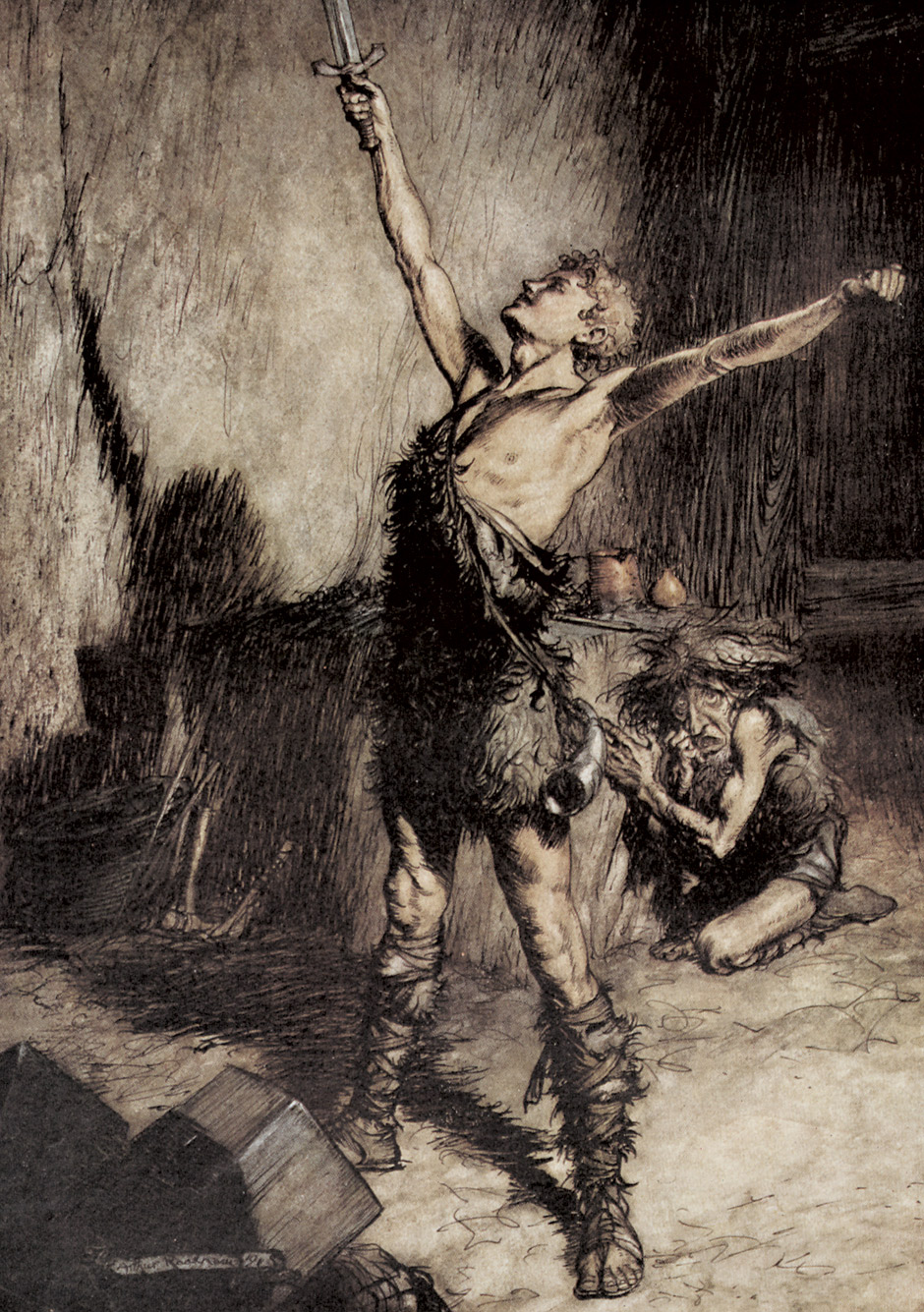
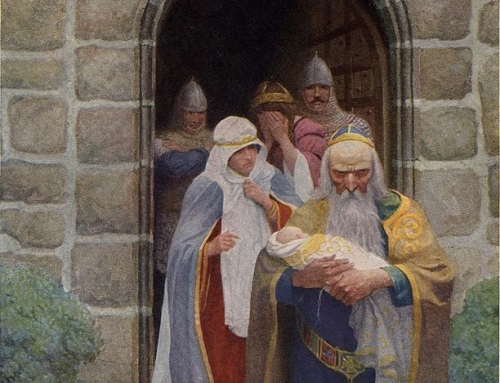
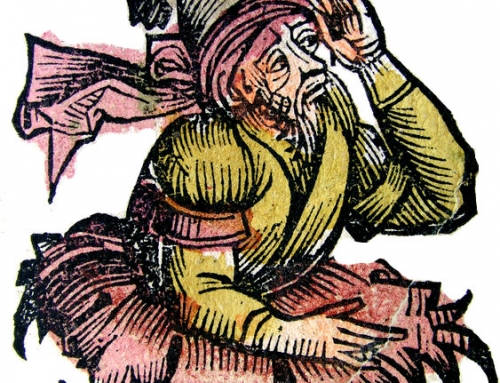

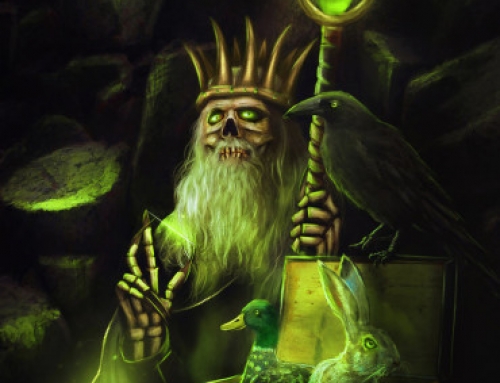
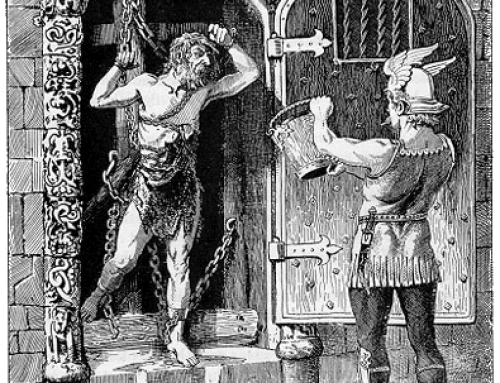
Leave A Comment